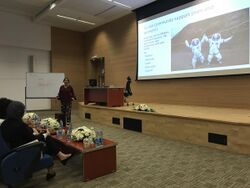Organization:Kuwait College of Science and Technology
| Type | Private |
|---|---|
| Established | 2016 |
| President | Prof. Khalid Al-Begain[1] |
| Location | Doha District, Al Asimah Governorate, Kuwait [ ⚑ ] : 29°19′27″N 47°47′18″E / 29.3242°N 47.7883°E |
| Website | www |
Kuwait College of Science and Technology (KCST) is a private university in Kuwait, offering undergraduate education in Engineering. KCST is located in Doha District, west of Kuwait City. KCST started its degree programs in 2016. Its operations are regulated by the Private Universities Council (PUC) of Kuwait.
Campus
The university campus is in Doha District, Al Asimah Governorate, near the border with Al Jahra Governorate, and the former Camp Doha.[2] It is a private university, owned by The Company of Science and Technology for Higher Education (COSTHE).[3][4][5][6]
The university campus has a large central library, a 500-seat main auditorium, and two 250-seat lecture theatres, as well as a number of lecture rooms, faculty and staff offices, and laboratories.[7] The on-campus sports facilities include a football ground and tennis courts with plans underway for a swimming pool and additional sports facilities.
Majors
The degree programs being offered include undergraduate degrees in Computer Science, Computer Engineering, and Electronics and Communications Engineering. The computer science degree program takes 4 years whereas the engineering degree programs take 4.5 years to complete.
The university also offers a pre-degree "Foundation" program with an emphasis on mathematics, physics, information technology, and English, which can take up to one year to complete. Both morning and evening sessions are offered. There are also a number of courses offered during the summer break.
Faculty
The university is rapidly expanding its teaching staff and, (As of January 2019), it has recruited around 65 faculty and teaching staff members from around the world. Most of the faculty members hold PhD degrees from prominent universities in North America, Europe, Australia, the Far East, Southeast Asia, and North Africa.
Research
Many members of the university faculty and teaching staff are actively engaged in research,[8][9][10] focusing on sensors and nano technology,[11] particle physics, high-performance computing, modeling and simulation, medical signal processing, and mobile and ubiquitous computing. A major source of research funding are the research grants awarded by the Kuwait Foundation for the Advancement of Sciences (KFAS).[12]
KCST periodically invites reputed international researchers in the fields of sciences and technology from around the world to deliver seminars at its campus to motivate its students and to bring awareness about the state-of-the-art in sciences and technology to its doorstep.

Academics
The curricula at the university were originally designed in consultation with the Indian Institute of Technology Delhi (IIT)[14] The curricula have been customized and adapted by the university faculty to fit the needs of Kuwaiti and Middle-Eastern students. Most of the courses being offered in the engineering degree programs have been organized into separate lecture (theoretical), tutorial (problem-solving), and lab (practical) sessions so that the students develop a thorough understanding of the subject being taught.[citation needed]
The laboratory facilities include modern physics labs, electronics and instrumentation labs, and computing labs.[15]
References
- ↑ "K. Al-Begain Homepage". https://at-web1.comp.glam.ac.uk/staff/kbegain/webpage/. Retrieved 21 January 2019.
- ↑ "Kuwait travel advice". https://www.gov.uk/foreign-travel-advice/kuwait. Retrieved 21 January 2019.
- ↑ "Gulf Aluminium". https://www.gulf-aluminium.com/en/project-detail/20/kuwait-college-for-science-and-technology. Retrieved 21 January 2019.
- ↑ "Kuwait College - First Education Company". http://www.fec.com.kw/fec/page/kuwait-college/. Retrieved 21 January 2019.
- ↑ "kuwait institute of science and technology – FROYO NATION BLOG". https://froyonation.wordpress.com/tag/kuwait-institute-of-science-and-technology/. Retrieved 21 January 2019.
- ↑ Sambidge, Andy. "Architects win $38m Kuwait University deal". https://www.arabianbusiness.com/architects-win-38m-kuwait-university-deal-490505.html. Retrieved 21 January 2019.
- ↑ Kuwait College of Science and Technology KCST. "Kuwait College of Science and Technology". https://www.youtube.com/watch?v=eRxUDK0GER0. Retrieved 21 January 2019.
- ↑ "Carlos M. da Fonseca's Publons profile". https://publons.com/researcher/1647871/carlos-m-da-fonseca/. Retrieved 21 January 2019.
- ↑ "K.K. Viswanathan - Google Scholar Citations". https://scholar.google.co.uk/citations?user=LSfLzTEAAAAJ&hl=en/. Retrieved 21 January 2019.
- ↑ "Murugappan M - Google Scholar Citations". https://scholar.google.com/citations?user=5StwdjgAAAAJ&hl=en. Retrieved 21 January 2019.
- ↑ Kandas, Ishac; Samir, Effat; Shehata, Nader (2018). "Plasmonic-Ceria Nanoparticles as Fluorescence Intensity and Lifetime Quenching Optical Sensor". Sensors 18 (9): 2818. doi:10.3390/s18092818. PMID 30150514.
- ↑ "Kuwait Foundation for the Advancement of Sciences (KFAS)". http://www.kfas.com/Home. Retrieved 21 January 2019.
- ↑ "HI-SEAS". http://hi-seas.org/. Retrieved 21 January 2019.
- ↑ "Sanjiva Prasad". https://www.cse.iitd.ernet.in/~sanjiva/#.
- ↑ "Kuwait College of Science & Technology - MATLAB Access for Everyone". https://uk.mathworks.com/academia/tah-portal/kuwait-college-of-science-and-technology-40641033.html. Retrieved 21 January 2019.





